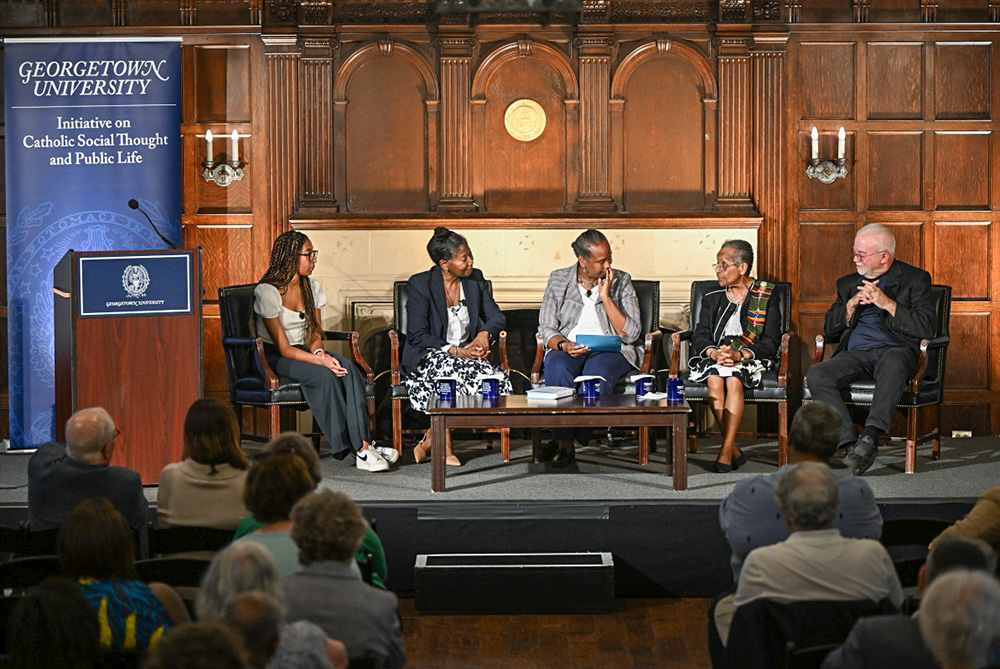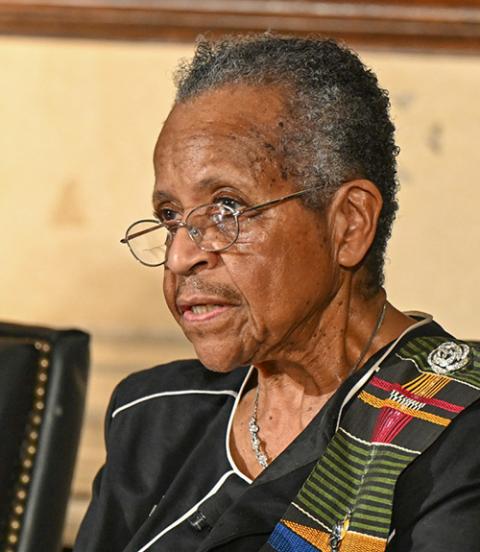
Participants in Georgetown University's June 4 panel discussion on "The Civil Rights Act of 1964 After 60 Years" were, from left: Kessley Janvier, Diann Rust-Tierney, moderator Kimberly Mazyck, Mercy Sr. Cora Marie Billings and the Rev. Jim Wallis. (Courtesy of Georgetown University/Rafael Suanes)
Sixty years after President Lyndon B. Johnson signed the Civil Rights Act of 1964, the United States finds itself at "the precipice of structural change," according to participants on a recent Georgetown University panel on the landmark law's anniversary.
The panel, an intergenerational group that included a college student activist, a Protestant minister, a Catholic religious sister, and a civil rights attorney and scholar, said voters this election year will decide whether to continue working toward being a multiracial democracy, or backslide into a country of rigid racial hierarchies.
"We all are at this point because we have not confronted the underlying problem: What kind of country are we going to be?" said Diann Rust-Tierney, the executive director of the Racial Justice Initiative at Georgetown University in Washington, D.C.
Rust-Tierney, the former executive director of the National Coalition to Abolish the Death Penalty, said Americans in the 2024 elections must choose whether or not the United States will be a country that prioritizes racial equality and sharing power equally.
"Or are we going to be a country that is committed to this project of racial hierarchy? That is exactly what is on the ballot in 2024," Rust-Tierney said during the panel, which was sponsored by Georgetown University's Initiative on Catholic Social Thought and Public Life.
Advertisement
Held June 4 in Georgetown University's Copley Formal Lounge, more than 1,500 people, online and in person, observed the panel discussion, which was titled "The Civil Rights Act of 1964 After 60 Years."
The panel dialogue presented a snapshot of complicated racial dynamics that are not only an important subtext in the 2024 presidential election, but have also been the source of renewed advocacy and tension in recent years amid police killings of unarmed Black people and the resulting street protests, calls for reforms and the conservative response to those actions.
Kessley Janvier, a Georgetown University senior who serves as vice president of the university's Black Student Alliance and NAACP chapter, said she advocates for issues such as reparations and voting rights because she realized as a teenager that while the Civil Rights Act of 1964 "created a baseline for racial equality," it has still not made that goal a reality.
"I think honestly that in and of itself, the fact that part of my time every week is spent going to meetings and making posters, I think it says enough about the progress that we have had as a society," said Janvier, a history major.
'Are we going to be a country that is committed to this project of racial hierarchy? That is exactly what is on the ballot in 2024.'
—Diann Rust-Tierney
While none of the panelists mentioned him by name, former President Donald Trump was an ever-present source of concern, given the presumptive Republican nominee's history of exploiting racial divisions, his authoritarian rhetoric and his conservative base's demonization of "wokeness" and critical race theory.
Rust-Tierney pointed to Project 2025, an ambitious initiative of the conservative Heritage Foundation to give the next Republican president near-total control over the executive branch. This, Rust-Tierney said, made the 2024 presidential election "not like any other," one that could lead to "a person staying in power in perpetuity and remake the country into something we do not recognize."
Jim Wallis, who leads the Center on Faith and Justice in the McCourt School of Public Policy at Georgetown University, asserted that, in 2024, "white supremacy is making a last stand, by any means necessary."
"This is an abnormal time and what we all do, we all do in the next five months is crucial to the future of this country for generations to come," said Wallis, who added that issues like voting rights need to be understood in terms of human dignity.
"Every effort to suppress or intimidate the vote is an assault literally on imago dei," said Willis. He referenced state-level legislative actions that enacted new voting restrictions in the wake of Trump's defeat to President Joe Biden in the 2020 presidential election.

Mercy Sr. Cora Marie Billings during Georgetown University's June 4 public dialogue on "The Civil Rights Act of 1964 After 60 Years" (Courtesy of Georgetown University/Rafael Suanes)
Panel member Mercy Sr. Cora Marie Billings, who led the Office for Black Catholics of the Diocese of Richmond, Virginia, for 25 years, spoke of the importance of confronting the country's history of racial prejudice and white supremacy.
"The challenge for me as an individual, and for us as individuals, lies in owning who we are, owning what we believe, owning what we have been brought up with, and owning the evil that's there that even comes to the church," said Billings, whose great-grandfather was enslaved in the 19th century by the Jesuit community at Georgetown University.
Regarding the 60-year-old Civil Rights Act, Billings — the first Black religious sister to lead a parish in the United States — said the law gave her hope as a young religious that things could change. She said the act also underscored for her the necessity of facing difficult truths with courage and compassion for other people.
"The change for me will come and we keep going with it when we altogether become relational and make sure we are working at it together," Billings said.




